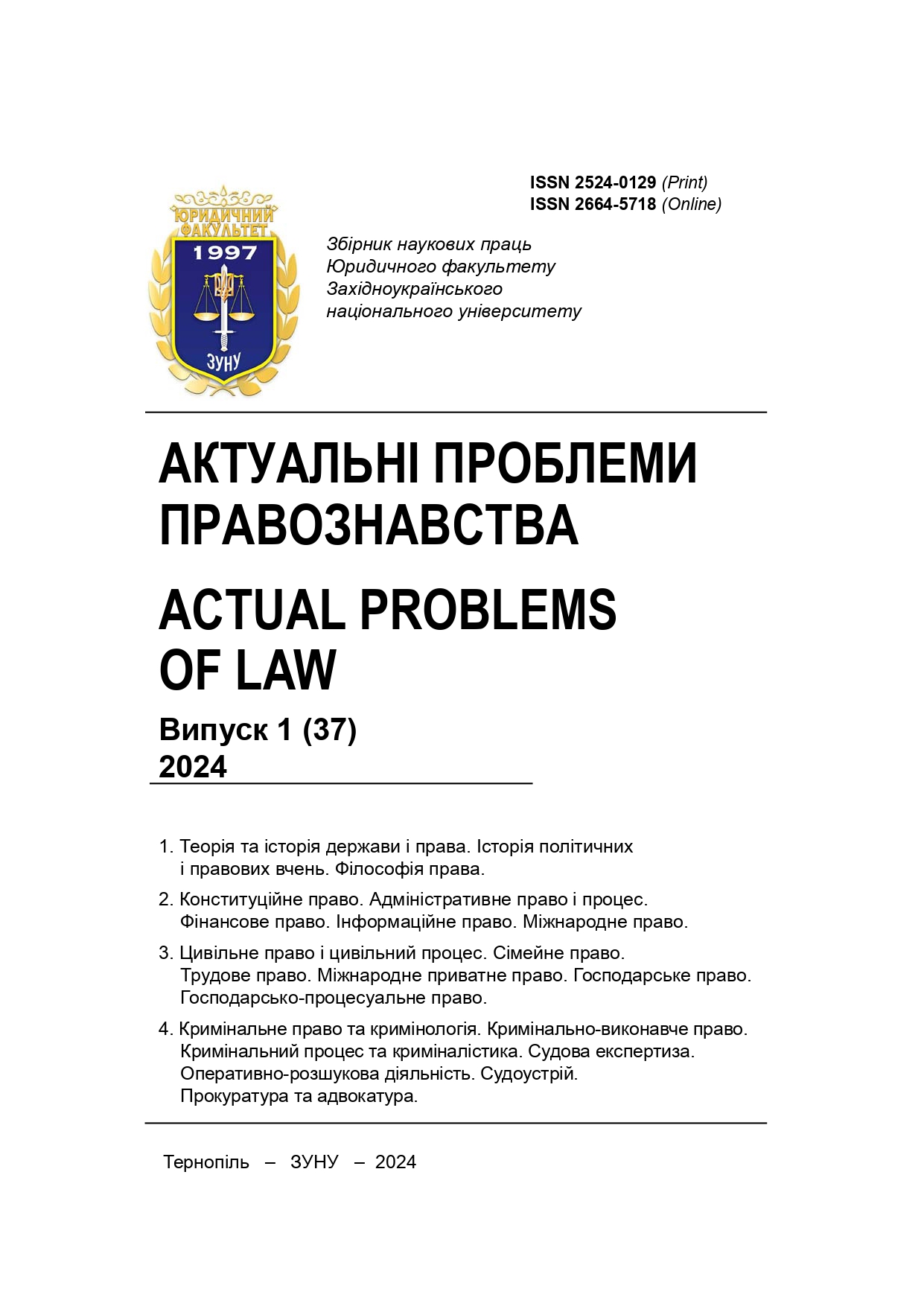Features of the application of legal customs in different legal systems
DOI:
https://doi.org/10.35774/app2024.01.006Keywords:
legal custom, Anglo-Saxon, Romano-Germanic, Muslim, application, act, sourcesAbstract
This scientific article examines the peculiarities of the application of legal customs in various modern legal systems. It is noted that historically the first source of law was legal custom, the process of its creation is directly related to the creation of the state. In primitive society, a person acted in a certain way under the influence of external circumstances, and the periodic repetition of such actions over a long period led to the emergence of the habit of acting in this way. However, it should be remembered that directly with the gradual complication of social relations, the habit acquired the character of a rule of conduct, mandatory for all members of a certain social group. In particular, the research determined that legal custom plays an important role in the Anglo-Saxon legal system. Today, this source of the law of foreign countries is used in the constitutional practice of Great Britain, Australia, and New Zealand, which accordingly demonstrates the important role of legal custom in regulating social relations in this legal system. In turn, it is determined that in the Romano-Germanic legal system, legal custom does not have such a significant role and practical importance as in the Anglo-Saxon one. Within the framework of this study, the peculiarities of the application of legal custom in Swiss civil law are demonstrated.
Also, in the scientific article, special attention is paid to the peculiarities of the application of legal custom in the states of the Muslim legal system. It was determined that Muslim law is largely based on legal customs, and therefore, even in the 21st century, they are actively used to regulate private-law and public-law relations in such countries as Afghanistan, Iran, Saudi Arabia, Syria, Sudan, Pakistan, etc.
Thus, within the framework of the study, the importance of the application of legal customs in modern conditions is substantiated, since normative legal acts, court precedents or other sources of law cannot fully satisfy the needs of society in the regulation of social relations, and therefore the use of legal customs is completely natural and justified.
Downloads
References
Martyniuk, R. S. (2007). Derzhavne (konstytutsiine) parvo zarubizhnykh krayin. Zaghalna chastyna: [State (constitutional) law of foreign countries. General part]. Navchalnyi posibnyk. Ostroh: Vydavnytstvo Natsionalnogho yniversytetu «Ostrozka academia» [in Ukrainian]
David, René (2002). Camille Jauffret-Spinosi. Les grands systèmes de droit contemporains. Paris: Dalloz [in French]
Bekhruz, Kh. (2009). Porivnialne pravoznavstvo [Comparative jurisprudence]: pidruchnyk. Odessa: Feniks [in Ukrainian]
Kelman, M. S. (2006). Zaghalna teoria derzhavy i prava [General theory of the state and law]. Pidruchnyk. Kyiv: Kondor
Kyrychenko, V. M. & Kurakin, O. M. (2012). Porivnyalne konstytutsiyne pravo [Comparative constitutional law]. Navchalnyi posibnyk. Kyiv: Tsentr uchbovoi literatury [in Ukrainian]
Teoria derzhavy i prava. Akademichnyi kurs [Theory of the state and law. Academic course] (2006): Pidruchnyk. Za redaktsiieiu O.V. Zaichuka, N.M.Onishchenko. Kyiv: Yurinkom Inter [in Ukrainian]
Shapoval, V. M. (2012). Konstytutsiine parvo zarubizhnykh krain [Constitutional law of foreign countries]. Pidruchnyk. Kyiv: ArtEk, Vyshcha shkola Constitutional law of foreign countries
Shapoval, V. M. (2008). Konstytutsiine parvo zarubizhnykh krain. Academic kurs [Constitutional law of foreign countries. Academic course]: pidruchnyk. Kyiv: Yurinkom Inter [in Ukrainian]
Heorghitsa, A. Z. (2000). Konstytutsiine parvo zarubizhnykh krain [Constitutional Law of Foreign Countries]. Navchalnyi posibnyk. Chernivtsi: Ruta [in Ukrainian]
Porivnialne pravoznavstvo [Comparative jurisprudence] (2012): pidruchnyk. Za redaktsiieiu O.V.Petryshyna. Kharkiv: Pravo [in Ukrainian]





